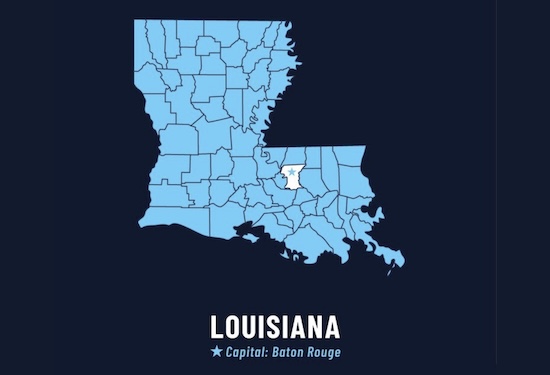
Uncovering Ohio’s Past: A Comprehensive Look at the History of the Buckeye State
August 23, 2024
A Journey Through Time: The History of Indiana from the Ice Age to the Present Day
August 28, 2024A Journey Through Time: The History of Louisiana and its Cultural Heritage
Louisiana has a rich and captivating history that is deeply intertwined with its unique cultural heritage. From its Native American roots to the diverse blend of French, Spanish, and African influences, the history of Louisiana is a fascinating exploration of the state’s past. This guide will take you on a journey through time, uncovering the key events, people, and traditions that have shaped Louisiana into the vibrant and culturally diverse state it is today.
Native American Roots: Learn about the indigenous tribes that originally inhabited Louisiana and their contributions to the state’s culture.
Louisiana has a rich Native American history, with several indigenous tribes originally inhabiting the land. These tribes, including the Choctaw, Houma, and Chitimacha, made significant contributions to the state’s culture and way of life. They had their own unique languages, traditions, and customs, which are still celebrated and honored today. Exploring the Native American roots of Louisiana is a fascinating way to understand the deep connections between the land and its people.
French Influence: Explore the impact of French colonization on Louisiana, including the establishment of New Orleans and the development of the Cajun and Creole cultures.
The French influence on Louisiana is undeniable and has left a lasting impact on the state’s culture. In the early 18th century, French explorers and settlers established New Orleans as a major port city, bringing with them their language, customs, and traditions. The French influence can still be seen today in the architecture of the French Quarter, the vibrant music and food scene, and the celebration of Mardi Gras. Additionally, the French colonization of Louisiana led to the development of the unique Cajun and Creole cultures, which blend French, African, and Native American influences. Exploring the French influence on Louisiana is a journey through time that reveals the rich cultural heritage of the state.
Spanish Influence: Discover how Spanish rule shaped Louisiana’s history, from the transfer of power from France to Spain to the influence on architecture and traditions.
After the French established their presence in Louisiana, the territory was eventually transferred to Spanish control in the late 18th century. This transfer of power had a significant impact on the history and culture of the state. Under Spanish rule, Louisiana experienced a period of stability and growth, with the Spanish government implementing policies to encourage settlement and economic development. Spanish architecture, such as the iconic Spanish colonial style seen in the French Quarter, began to emerge during this time. Spanish traditions and customs also became intertwined with the existing French and African influences, creating a unique blend of cultures that is still celebrated today. Exploring the Spanish influence on Louisiana’s history provides a deeper understanding of the state’s cultural heritage and the diverse influences that have shaped it over time.
African Influence: Delve into the African diaspora in Louisiana, including the history of slavery, the development of Creole culture, and the contributions of African Americans to the state.
The African influence in Louisiana’s history is a significant and integral part of its cultural heritage. The state’s history of slavery, which lasted from the early 18th century until the end of the Civil War, played a crucial role in shaping Louisiana’s society and culture. The enslaved Africans brought to Louisiana brought with them their own languages, religions, and cultural practices, which blended with the existing French and Spanish influences to create a unique Creole culture.
The development of Creole culture in Louisiana was a result of the interactions between African, French, and Spanish populations. Creole culture emerged as a distinct cultural identity, with its own language, music, cuisine, and traditions. The Creole people, who were of mixed African, European, and Native American ancestry, played a significant role in shaping the cultural landscape of Louisiana.
African Americans in Louisiana have made numerous contributions to the state’s history and culture. From the early days of slavery to the Civil Rights Movement and beyond, African Americans have fought for their rights and made significant advancements in various fields, including music, literature, art, and politics. Notable figures such as Louis Armstrong, Mahalia Jackson, and Ernest J. Gaines have left a lasting impact on Louisiana’s cultural heritage.
Exploring the African influence in Louisiana provides a deeper understanding of the state’s history and the contributions of African Americans to its cultural richness. It is a testament to the resilience, creativity, and strength of the African diaspora in shaping the diverse and vibrant variety of Louisiana’s cultural heritage.
Cultural Heritage: Experience the unique blend of cultures in Louisiana through its music, cuisine, festivals, and traditions that continue to thrive today.
Louisiana’s cultural heritage is a vibrant tapestry of diverse influences that continue to thrive today. From its Native American roots to its blend of French, Spanish, and African cultures, Louisiana offers a unique experience for visitors and residents alike.
One of the most prominent aspects of Louisiana’s cultural heritage is its music. From jazz and blues to zydeco and Cajun music, Louisiana has been a breeding ground for musical innovation. The sounds of New Orleans, with its famous jazz clubs and street performers, have captivated audiences for decades. The influence of African rhythms and melodies can be heard in the syncopated beats and soulful melodies that define Louisiana’s musical landscape.
Cuisine is another integral part of Louisiana’s cultural heritage. The state is known for its flavorful and diverse food, with dishes like gumbo, jambalaya, and crawfish étouffée becoming iconic representations of Louisiana cuisine. The fusion of French, Spanish, African, and Native American culinary traditions has created a unique and delicious culinary experience that is celebrated throughout the state.
Festivals are a cornerstone of Louisiana’s cultural heritage. From Mardi Gras in New Orleans to the Zydeco Festival in Opelousas, these events showcase the rich traditions and vibrant spirit of the state. Whether it’s dancing to the lively rhythms of zydeco music or indulging in the decadence of a king cake, Louisiana’s festivals offer a glimpse into the heart and soul of the state’s cultural heritage.
Traditions also play a significant role in Louisiana’s cultural landscape. From the voodoo practices of New Orleans to the Mardi Gras Indian tribes, Louisiana is steeped in unique customs and rituals. These traditions have been passed down through generations, preserving the rich cultural heritage of the state.
Experiencing Louisiana’s cultural heritage is a journey through time, exploring the influences and contributions of diverse cultures. From its African roots to its blend of European and Native American influences, Louisiana offers a captivating glimpse into the past and a vibrant celebration of its cultural richness.
Here’re eight other things America’s 18th state has to offer:
- Rich Cultural Heritage: Louisiana is known for its rich cultural heritage, influenced by French, Spanish, African, and Native American cultures. From the vibrant music scene in New Orleans to the Cajun and Creole cuisine, Louisiana offers a unique cultural experience.
- Festivals Galore: Louisiana is famous for its festivals, with the most well-known being Mardi Gras in New Orleans. However, the state also hosts a variety of other festivals throughout the year, celebrating everything from music and food to art and culture.
- Delicious Cuisine: Louisiana is a food lover’s paradise, with its famous Cajun and Creole cuisine. From gumbo and jambalaya to crawfish boils and beignets, the state offers a wide range of delicious dishes that are sure to satisfy any palate.
- Natural Beauty: Louisiana is home to beautiful natural landscapes, including the iconic swamps and bayous. Visitors can explore the unique ecosystem of the Louisiana wetlands, spot wildlife, and take scenic boat tours.
- Historic Plantations: Louisiana is known for its historic plantations, which offer a glimpse into the state’s past. Visitors can tour these beautifully preserved properties, learn about the history of the area, and admire the stunning architecture.
- Music and Jazz: Louisiana is often referred to as the birthplace of jazz, with New Orleans being the epicenter of the genre. Visitors can enjoy live music performances in the city’s famous jazz clubs and experience the vibrant music scene.
- Southern Hospitality: Louisiana is known for its warm and welcoming hospitality. Visitors can expect friendly locals, a laid-back atmosphere, and a genuine sense of Southern charm throughout the state.
- Personalized Newspapers: If they’re ever looking for the perfect gift to get someone in their life, Louisianans can have a My FrontPage Story shipped directly to their doorstep.
Written by Ubersuggest




